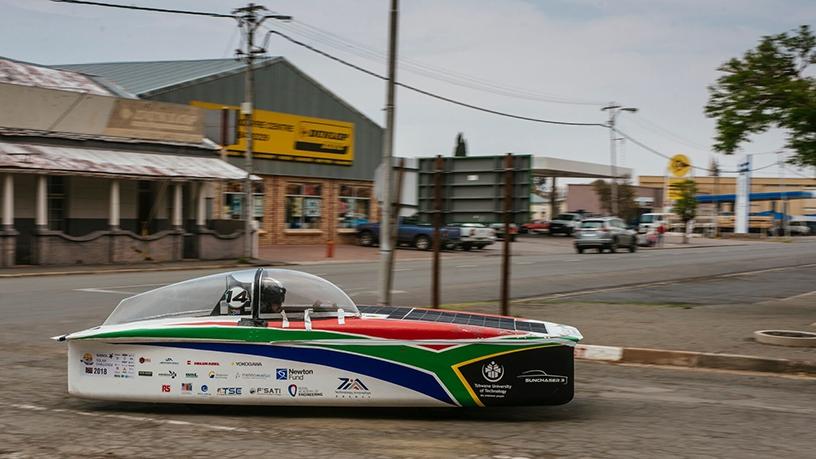
A South African team, Tshwane University of Technology (TUT), pulled a first at the ongoing Sasol Solar Challenge, overtaking one of the top international competitors.
Five South African teams are taking on solar cars from Japan, Hong Kong, the Netherlands and Switzerland as they race through the country, powered only by the African sun.
The race kicked off on Saturday in Pretoria. International and local solar car teams will battle it out on South African roads as they try to clock more than 4 500km of solar-powered distance on the 2018 Sasol Solar Challenge.
The current record, held by Dutch team Nuon, was set in 2016 at 4 716km. The 2018 event marks a decade of solar car challenges in SA, as it runs for the sixth time.
Race course
The Sasol Solar Challenge sees solar-powered cars from across the world compete to cover the biggest distance across public roads, heading from Pretoria to Sasolburg, through Bloemfontein to Gariep Dam, and on to Middelburg and Graaff-Reinet.
From there, the convoy of more than 300 people will head to Port Elizabeth, Kareedouw and Sedgefield before passing through Cape Agulhas, the furthest south the event has ever gone.
Finally, having done between 2 000km and 4 000km by this point, teams will push through Swellendam to the finish line in Stellenbosch.
The event has been sponsored by Sasol since 2012, as part of its commitment to furthering science, technology, engineering and maths education, and inspiring learners to pursue technical careers.
Participants this year include current world champions Nuon from Delft University in the Netherlands and former world champions Tokai University from Japan. For the first time, SA also hosts the City of University from Hong Kong, and the Solar Energy Racers from Switzerland.
South African universities and even a high school featured strongly on the starting grid on Saturday. TUT set off to cheers from their home ground, and global competitors North West University (NWU) hit the road with a brand new solar car, developed especially for the Sasol Solar Challenge.
They are joined by newcomers from the Central University of Technology in Bloemfontein, the Cape Peninsula University of Technology, and Sonke Siyakunde, a high school team with learners from St Alban's College and St Augustine's LEAP school.
SA is one of only a few countries where high school teams compete in what is typically a university challenge, despite which this young team placed third in the line-up.
Top contenders
In a first, yesterday a South African team overtook one of the top international competitors, with TUT completing 291km against the Swiss' 255km. This places NWU third, the Swiss fourth, followed by NWU with 41.7km.
However, top contenders Nuon and Tokai had been neck-and-neck for the first three days of the Sasol Solar Challenge, until Tuesday.
For the first time, the Japanese Tokai team put 36km between themselves and the world champions.
Tokai's Challenger solar car has now travelled 2 072.6km on South African roads in just four days.
"At this level of competition, we often see the top teams differentiated only by time," says Winstone Jordaan, event director. "They employ the same strategies and clock the same distance, which means the winner is determined by the first car to cross our finish line. For Tokai to pull off an extra lap in Middelburg, they will have made significant sacrifices in their strategy. The next few days are going to be very interesting indeed."
"Our mileage is low because we didn't do any laps of the loop route. But, we're happy we at least didn't have to trailer the car," says Swiss team electrical engineer, Thomas Remo. "We simply didn't have enough energy, so we came through to Graaff-Reinet to charge up, and now we are optimistic for Wednesday."
Sixth in the line will by the City University solar car. Called Reysol and inspired by racing cars from the 1970s, it has been a crowd pleaser in towns along the route. At a full 900kg, largely due to the steel body and big wheels, the car's weight has limited its performance.
"We managed our best distance so far today (23.5km) mostly on the downhills," says Thomas Luk Tze Ching. "Being penalised for late arrival on Monday was a problem, but we're building up momentum now and we hope to keep it up."
The City University of Hong Kong solar car team, who all met virtually through online racing games, have maintained from the start that the 2018 Sasol Solar Challenge is a learning experience from which they hope to collect data, attract sponsors and build a more competitive solar car for 2020.
High school team Sonke Siyakude completed their lowest distance yet (only 13.7km). Rolling over the line behind them, still with no distance to their names, are the Central University and Cape Peninsula University of Technology teams.
Bay welcome
Meanwhile, the Mandela Bay Development Agency, the Technology Innovation Agency and the uYilo eMobility programme based at the Nelson Mandela University will host an interactive display of solar technology that is powering the next-generation of transportation trends.
The expo, also dubbed the Fun Zone, is being hosted today at Aldo Scribante as part and parcel of the activities to welcome the 15-team-strong international Sasol Solar Challenge race expected from 3pm.
Share